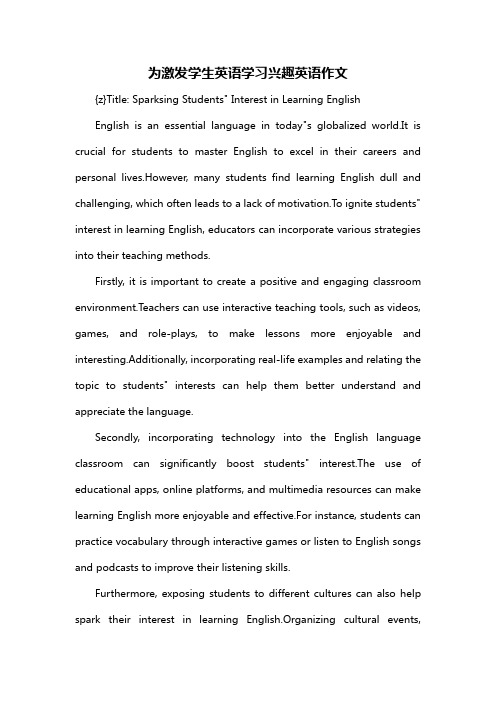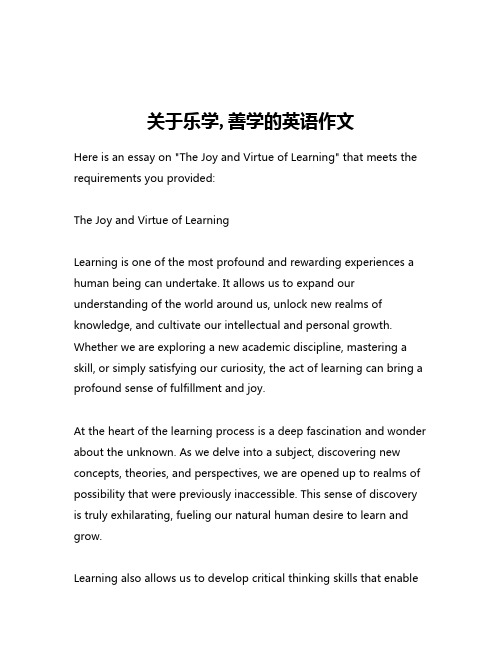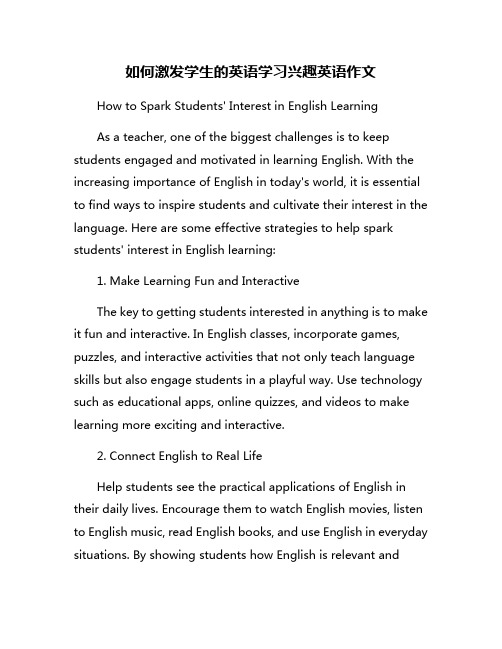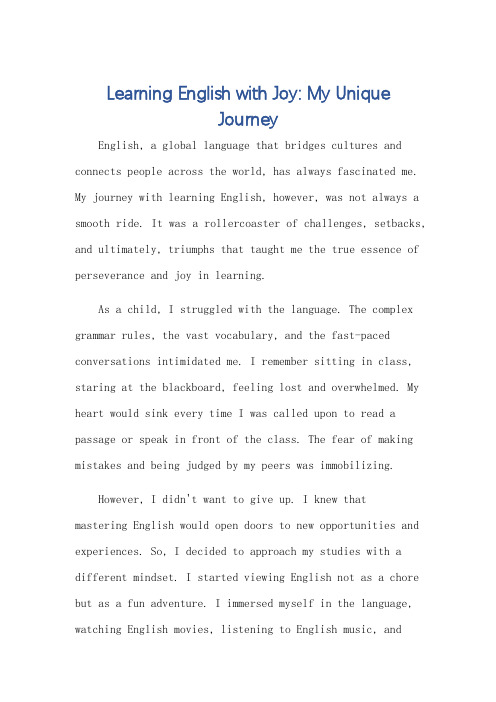让学生乐学英语论文
为激发学生英语学习兴趣英语作文

为激发学生英语学习兴趣英语作文{z}Title: Sparksing Students" Interest in Learning EnglishEnglish is an essential language in today"s globalized world.It is crucial for students to master English to excel in their careers and personal lives.However, many students find learning English dull and challenging, which often leads to a lack of motivation.To ignite students" interest in learning English, educators can incorporate various strategies into their teaching methods.Firstly, it is important to create a positive and engaging classroom environment.Teachers can use interactive teaching tools, such as videos, games, and role-plays, to make lessons more enjoyable and interesting.Additionally, incorporating real-life examples and relating the topic to students" interests can help them better understand and appreciate the language.Secondly, incorporating technology into the English language classroom can significantly boost students" interest.The use of educational apps, online platforms, and multimedia resources can make learning English more enjoyable and effective.For instance, students can practice vocabulary through interactive games or listen to English songs and podcasts to improve their listening skills.Furthermore, exposing students to different cultures can also help spark their interest in learning anizing cultural events,exchange programs, or virtual field trips can provide students with the opportunity to learn about different countries and their languages.This not only enhances their language skills but also broadens their horizons.Moreover, assigning meaningful and relevant projects can motivate students to learn English.For example, students can create presentations on topics they are passionate about or write letters to pen pals abroad.Such projects not only improve their language skills but also make learning English more purposeful.In conclusion,激发学生学习英语的兴趣是至关重要的。
使学生快乐成长英文作文

使学生快乐成长英文作文Growing up should be a joyful experience for students. It's important for them to have fun while learning and developing new skills. When students are happy, they are more likely to be engaged in their studies and open to new ideas.In order to create a happy and nurturing environment for students, it's essential for teachers to be supportive and encouraging. By showing genuine interest in their students' well-being and success, teachers can help foster a positive and uplifting atmosphere in the classroom.In addition to the support of teachers, it's also important for students to have opportunities for creative expression. Whether it's through art, music, or drama, creative outlets can help students explore their interests and develop a sense of individuality.Physical activity is another key component of a happyand healthy learning environment. Whether it's through organized sports or simply playing outside during recess, physical activity can help students release energy and reduce stress.Building strong relationships with peers is alsocrucial for students' happiness and growth. By encouraging teamwork and collaboration, students can learn important social skills and develop a sense of community within their school.Finally, it's important for students to have opportunities for personal growth and self-discovery. Whether it's through independent projects or self-reflection activities, students should have the chance to explore their own interests and passions.In conclusion, creating a happy and nurturing environment for students is essential for their growth and development. By providing support, encouraging creativity, promoting physical activity, fostering relationships, andallowing for personal growth, educators can help students thrive and enjoy their journey of growing up.。
关于乐学,善学的英语作文

关于乐学,善学的英语作文Here is an essay on "The Joy and Virtue of Learning" that meets the requirements you provided:The Joy and Virtue of LearningLearning is one of the most profound and rewarding experiences a human being can undertake. It allows us to expand our understanding of the world around us, unlock new realms of knowledge, and cultivate our intellectual and personal growth. Whether we are exploring a new academic discipline, mastering a skill, or simply satisfying our curiosity, the act of learning can bring a profound sense of fulfillment and joy.At the heart of the learning process is a deep fascination and wonder about the unknown. As we delve into a subject, discovering new concepts, theories, and perspectives, we are opened up to realms of possibility that were previously inaccessible. This sense of discovery is truly exhilarating, fueling our natural human desire to learn and grow.Learning also allows us to develop critical thinking skills that enableus to navigate the complexities of the modern world. By analyzing information, evaluating different viewpoints, and drawing our own conclusions, we cultivate the ability to make informed decisions and solve problems effectively. This intellectual flexibility is essential for thriving in an ever-changing global landscape.Moreover, the pursuit of knowledge can be deeply rewarding on a personal level. As we learn, we expand our horizons and gain a deeper understanding of ourselves, our values, and our place in the world. This self-awareness and introspection can lead to greater emotional intelligence, empathy, and a heightened sense of purpose.In addition to the intellectual and personal benefits, learning can also have a positive impact on our communities and society as a whole. When individuals are empowered with knowledge and critical thinking skills, they are better equipped to contribute to the social, economic, and cultural fabric of their communities. This collective growth and development can lead to more informed decision-making, innovation, and social progress.However, the joy and virtue of learning extend beyond the mere acquisition of knowledge. It is the process of learning itself that holds the greatest value. The act of questioning, exploring, and discovering can be deeply fulfilling, as it allows us to engage our curiosity, challenge our assumptions, and push the boundaries of ourunderstanding.This process of active engagement is essential for true learning to take place. It requires a willingness to step out of our comfort zones, embrace uncertainty, and engage with new ideas and perspectives. By approaching learning with an open and receptive mindset, we can cultivate a lifelong love of learning that will serve us well throughout our lives.In today's rapidly evolving world, the ability to learn and adapt is more important than ever. As we face new challenges and opportunities, the capacity to continuously learn and grow will be a key driver of personal and societal progress. By embracing the joy and virtue of learning, we can unlock our full potential, contribute to a better future, and find a deeper sense of fulfillment in our lives.In conclusion, the pursuit of knowledge and the act of learning are not merely academic endeavors; they are essential components of a fulfilling and meaningful life. By cultivating a love of learning and a dedication to continuous growth, we can unlock a world of possibilities, deepen our understanding of ourselves and the world around us, and contribute to the betterment of our communities and society as a whole.。
激发学生学英语的兴趣英语作文

激发学生学英语的兴趣英语作文In today's globalized world, the importance of learning English has become increasingly apparent. However, many students struggle to find motivation and interest in learning the language, often finding it boring and monotonous. As educators, it is our responsibility to create an engaging and exciting learning environment that sparks students' interest in English.One effective way to achieve this is through the use of innovative teaching methods. By employing creative and interactive techniques, we can make the learning process more fun and engaging for students. One such method is the use of technology in the classroom. By integrating digital tools and resources into our lessons, we can bring the language to life and make it more relevant to students' daily lives.For example, we can use educational apps and online platforms to deliver interactive quizzes, games, and simulations that allow students to practice their English skills in a fun and engaging way. These tools not only make learning more enjoyable but also provide instant feedback,allowing students to identify their areas of improvement and work towards enhancing their language proficiency.Another innovative teaching method is the adoption of a project-based learning approach. By assigning real-world projects that require students to apply their English skills, we can help them see the practical value of learning the language. For instance, students can be asked to create a travel brochure in English, or to present a research paper on a topic related to their interests. These projects not only help students develop their language skills but also foster their creativity and critical thinking abilities.Moreover, it is crucial to create a classroom environment that is conducive to learning and encourages active participation. This can be achieved by fostering a positive learning culture where students feel comfortable asking questions, sharing their ideas, and collaborating with peers. Teachers can also encourage students to participate in group discussions and role-playingactivities that help them practice their speaking and listening skills in a safe and supportive environment.Additionally, it is important to recognize and celebrate students' achievements. By acknowledging their efforts and progress, we can boost their confidence and motivation to learn English. Teachers can implement a rewards system that recognizes students for their participation, accuracy, and creativity in English-related activities.In conclusion, sparking students' interest in learning English requires a conscious effort from educators to create an engaging and exciting learning environment. By employing innovative teaching methods, integrating technology into the classroom, adopting a project-based learning approach, fostering a positive learning culture, and recognizing students' achievements, we can foster a love for learning English that will benefit students throughout their academic and professional careers.**激发学生学英语的兴趣:创新教学方法的力量** 在当今全球化的世界中,学习英语的重要性日益凸显。
如何激发学生的英语学习兴趣英语作文

如何激发学生的英语学习兴趣英语作文How to Spark Students' Interest in English LearningAs a teacher, one of the biggest challenges is to keep students engaged and motivated in learning English. With the increasing importance of English in today's world, it is essential to find ways to inspire students and cultivate their interest in the language. Here are some effective strategies to help spark students' interest in English learning:1. Make Learning Fun and InteractiveThe key to getting students interested in anything is to make it fun and interactive. In English classes, incorporate games, puzzles, and interactive activities that not only teach language skills but also engage students in a playful way. Use technology such as educational apps, online quizzes, and videos to make learning more exciting and interactive.2. Connect English to Real LifeHelp students see the practical applications of English in their daily lives. Encourage them to watch English movies, listen to English music, read English books, and use English in everyday situations. By showing students how English is relevant anduseful in real life, you can motivate them to learn and improve their language skills.3. Personalize LearningEvery student is unique and has different interests and learning styles. To spark students' interest in English, personalize their learning experience by incorporating their interests and hobbies into lessons. For example, if a student loves sports, use sports-themed activities or articles in English to make learning more engaging for them.4. Create a Positive Learning EnvironmentA positive and supportive learning environment is essential for fostering students' interest in English. Encourage students to express themselves freely, make mistakes without fear of judgment, and celebrate their progress and achievements. By creating a safe and encouraging atmosphere, students will feel more motivated and confident in their English learning journey.5. Set Clear Goals and RewardsHelp students set clear goals for their English learning and provide rewards or incentives for reaching those goals. Whether it's passing a test, participating in a class discussion, orcompleting a project, rewards can motivate students to stay focused and committed to improving their English skills.6. Encourage Peer CollaborationCollaboration with peers can make learning more engaging and enjoyable. Encourage students to work together on group projects, participate in discussions, and practice English conversation with their classmates. Peer collaboration can help students build confidence, learn from each other, and develop effective communication skills in English.7. Incorporate Cultural ActivitiesLearning about English-speaking countries' culture can make English learning more interesting and meaningful. Organize cultural activities, such as celebrating holidays, festivals, or traditions from English-speaking countries, to expose students to different cultures and enhance their understanding and appreciation of the language.In conclusion, sparking students' interest in English learning requires creativity, flexibility, and dedication. By incorporating fun and interactive activities, connecting English to real life, personalizing learning, creating a positive environment, setting clear goals, encouraging peer collaboration, and incorporatingcultural activities, teachers can inspire students to engage with English and achieve success in their language learning journey.。
如何让后进生乐学英语论文

如何让后进生乐学英语新课程着眼于培养学生终身学习的愿望与能力。
因此,正确对待后进生尤为重要。
如何让后进生乐学英语,怎样激发和培养后进生的学习兴趣?一、课堂教学是教学的主渠道,在课堂上提高学生特别是后进生的英语学习兴趣尤为重要俗语说得好“兴趣是最好的老师”。
提高兴趣的方法很多,我常常采用以下几种方法,效果很好。
1.建立零距离的师生感情英语相对于语文、数学等学科来说是陌生的“外语”,后进生在对英语学习产生向往的同时,也产生了一定的恐惧和无奈的心理。
因而他们强烈渴望从任课老师的言行中找到精神上的依靠,以达到心理上的平衡。
所以,在教学活动之余,放下老师师道尊严的架子,和他们一起搞活动、做游戏,成为他们中间的一分子,以达到思想上和行动上的一致与共识,为创造良好的师生关系打下更坚实的基础。
由此可见,零距离的师生情感是融洽师生关系的纽带,是激发英语学习兴趣的基础,从而使学生乐学英语。
2.把音乐引入英语教学音乐配合英语教学,能减少对英语有畏难情绪的学生的心理压力,给他们创造了有利于学习的环境。
同时教会学生唱英语歌曲可使他们产生强烈的成就感,从而激发兴趣。
二、丰富多彩的英语课外活动是对课堂教学的有益补充,可大大激发和培养后进生的学习兴趣在教学实践中,我常常采用以下几种方法,效果很好。
1.阅读或讲故事比赛活动教师根据学生的年龄特点、兴趣、词汇量、语法和知识来选取和推荐适合他们的阅读材料。
以趣味性强的小笑话、小幽默和小故事为主。
根据学生的学习进度,教师从阅读技巧上加以指导。
讲故事比赛一般在班内或同一年级范围内进行,教师首先要指导学生选好题目,演讲内容要健康。
其次注意演讲技巧。
对于比赛优胜者要及时给予奖励表彰。
为了提高学生阅读的积极性,年级内可每学期组织一次,班内每学月组织一次。
每天课前五分钟有一名学生作值日报告时要求其讲励志或幽默故事,以此来作好比赛的铺垫。
2.开展英美文化专题讲座及知识竞赛语言的学习离不开对文化的了解和吸收。
小学英语教学论文:怎样让学生乐学、善学英语

小学英语教学论文:怎样让学生乐学、善学英语在我们巨人家教中心,面对小学英语教学,我认为要想培养我们的学生的学习兴趣,首先一点,同时也是最重要的一点就是应该制造活跃的英语课堂气氛,诱发学生学习的兴趣和求知欲;往往这一点也是最难的。
因为我们面对的每个学生都是不同的个体,管理好一个学生就像是管理好一个班级一样,而我们家教部的老师们,相对来说是更伟大的,因为我们每个人都管理着十多个、甚至是二十多个班级。
其次,充分研究每一位学生上课所需教授的教材,认真备课,激发学生学习英语的趣味性;注重"以学生为本",建立巨人家教中心老师与学生的新型师生关系,重视师生之间情感交流。
开展内容广泛、形式多样的英语课外活动等。
我们知道:兴趣是最好的老师。
一个成功的英语教师要在教学中有意识地培养学生对英语的兴趣,激励学生不断处于较佳的学习状态之中,使他们对英语乐学、善学、会学。
第一、英语课堂气氛,诱发学生学习的兴趣和求知欲。
就此,我想谈谈曾经的一个学生胡琪琛,他很好动,求新求异的愿望很强烈。
针对这样的孩子,首先千万不要为了盲目追求教师把握课堂的纪律而去打击他的好奇心和求知欲。
所以上课时,我尽可能多地用抑扬顿挫、语调丰富、充满诱因或悬念的语言,并配以丰富的表情和手势来组织课堂教学,(事实上,body-language却很少应用,因为咱们很少站着)我想,这样的话就已经给胡琪琛创造了一个既开放又宽松的学习环境。
在我们幽默诙谐、和谐宽松的课堂气氛,使他每次上课都怀着轻松愉快的心情迅速投入到学习中,慢慢地,还敢用英语大胆发言,(尽管刚开始时候是半英半中,甚至大多数中文,但后来越来越好,)最终,不断产生学习英语的兴趣。
其实,兴趣提高了,成绩也自然就上去了!第二、教材的选用、课间休息时间的安排、课前的导入等对学生学习的影响。
在英语学科教学中,有琳琅满目的教材,甚至一个年级还会采用不同教材的版本。
事实上,各个教材都有他各自的优势及劣势,为学生选用正确的教材是很有必要的,这里我所指的正确的教材就是适合你教授孩子的教材,可多方面去考虑,例如:可根据学生的学习程度,优秀、良好或补基础知识等划分;比如我的一位学生付同学,他刚来时候学习北京市英语等级考试一级,经过第一次上课,从口语表达能力、听力理解、阅读做题等来看,他的单词量完全可以达到北京市英语等级考试二级冲刺的水平,我立即把我的想法坦诚地和他的母亲交流了一下,建议冠雄立即更改教材,由于更改教材很及时,所以,经过几个月的时间,孩子就报名考了BETS-2级,我有信心孩子一定能通过;另外,我们还可以根据每个学生不同的学习目的而划分,从而推荐给学生最适合他学习的教材,达到事半功倍的效果;比如,在培训之前,往往学生的家长都很迷茫,对于市场上现存的那么多的考试课程及教材,从而盲目的报班、考试等,从本质上忽略了学生的本身能力,因此,要对这些学生尽量进行入学考试,口试或笔试均可,根据老师的专业知识,摸清学生到底是什么程度,及在学习过程中存在的问题,态度虔诚、婉转向家长说明学生存在的不足与弱项;现存一种现象,在英语教学中,很多孩子家长听说小升初的许多重点中学,要求学生必须达到新概念二级的水平,而且其中交大附中等中学小升初面试时,让学生阅读新二的文章,因此,众多家长都给自己的孩子报名学习新概念二级。
乐学英语经历英语作文的

Learning English with Joy: My UniqueJourneyEnglish, a global language that bridges cultures and connects people across the world, has always fascinated me. My journey with learning English, however, was not always a smooth ride. It was a rollercoaster of challenges, setbacks, and ultimately, triumphs that taught me the true essence of perseverance and joy in learning.As a child, I struggled with the language. The complex grammar rules, the vast vocabulary, and the fast-paced conversations intimidated me. I remember sitting in class, staring at the blackboard, feeling lost and overwhelmed. My heart would sink every time I was called upon to read a passage or speak in front of the class. The fear of making mistakes and being judged by my peers was immobilizing.However, I didn't want to give up. I knew thatmastering English would open doors to new opportunities and experiences. So, I decided to approach my studies with a different mindset. I started viewing English not as a chore but as a fun adventure. I immersed myself in the language, watching English movies, listening to English music, andreading books in English. This newfound enthusiasm for the language helped me overcome my fears and emboldened me to speak more confidently.As I progressed, I realized that learning Englishwasn't just about memorizing rules and vocabulary. It was about understanding culture, history, and people. I started exploring different English-speaking countries, their traditions, and their way of life. This broadened my horizons and made me more tolerant and understanding of different perspectives.One of the most significant milestones in my learning journey was when I participated in an international exchange program. It was an eye-opening experience that allowed me to interact with native English speakers and immerse myself in their culture. The initial nervousness and awkwardness soon gave way to excitement and ease as I found common ground with my peers through shared interests and experiences. This experience not only improved my language skills but also instilled in me a sense of confidence and independence.Looking back, I realize that the key to my successful English learning experience was the joy I found in the process. I didn't focus on the end result or the grades; I enjoyed the journey and the challenges it brought. This positive attitude helped me stay motivated and driven, even when faced with difficulties.In conclusion, learning English has been a transformative experience that has opened new doors for me and broadened my horizons. It has taught me the importance of perseverance, the joy of learning, and the power of understanding and respecting diverse cultures. My journey is ongoing, and I look forward to what the future holds, knowing that with my improved English skills, I am well-equipped to navigate the global stage.**以乐学英语:我的独特之旅**英语,这门全球通用的语言,连接着不同文化,让世界各地的人们能够沟通。
- 1、下载文档前请自行甄别文档内容的完整性,平台不提供额外的编辑、内容补充、找答案等附加服务。
- 2、"仅部分预览"的文档,不可在线预览部分如存在完整性等问题,可反馈申请退款(可完整预览的文档不适用该条件!)。
- 3、如文档侵犯您的权益,请联系客服反馈,我们会尽快为您处理(人工客服工作时间:9:00-18:30)。
让学生乐学英语
摘要:培养学生学习英语的兴趣,充分调动学生学习英语的主动性,应引起英语教师的足够重视。
学生的学习主动性增强了,课堂教学变得生动活泼了,学生在教师的引导下,就会学得轻松自如,会获得意想不到的效果。
下面谈谈我的几点尝试。
关键词:初中英语教学
培养学生学习英语的兴趣,充分调动学生学习英语的主动性,应引起英语教师的足够重视。
学生的学习主动性增强了,课堂教学变得生动活泼了,学生在教师的引导下,就会学得轻松自如,会获得意想不到的效果。
下面谈谈我的几点尝试。
一、把课堂教学安排得生动活泼,充分调动学生学习的主动性
富有魅力的教学应在生动活泼、令人愉悦的课堂气氛中进行。
课堂教学生动活泼、充满友好合作的气氛,学生就会心情舒畅地参与教学活动,因而使他们注意力集中、思路开阔、思维敏捷,取得良好学习效果。
在教学中,教师要精心设计教学活动,努力创设轻松、愉快的氛围,使双边活动和谐、自然,师生之间密切配合,在愉悦的气氛中实现教与学的共振。
学生是教学的主体,课堂上的一切活动都应围绕学生而进行,教师应为学生的学习创造条件。
学生的学习是主动的,课堂上不再是教师怎样把学习内容讲全讲透,而是要引导学生如何去理解,去自己弄清所学内容。
学生在课堂上看书、思考、讨论、实践、练习,始终处于积极的、主动的状态。
要想达到如此
效果,就要做到充分利用实物、图片教具或简笔画,诱导学生动口、动耳、动手、动脑,去积极地吸收语言信息,然后进行语言交际活动。
教师还应尽可能地设计些游戏、猜谜等活动,并让学生扮演角色,在教师的指导下进行充分的展示。
这样的练习,使学生掌握了语言知识,同时又活跃了课堂气氛。
学生在活动中注意力集中,始终处于积极主动的学习状态。
教师应努力创设民主、宽松的教学氛围,采用启发式教学,鼓励学生创造性地发表各种见解,而不是把自己的意见强加给学生。
学生大量参与教学活动,促进了师生情感交流,学生学习变得更加主动,更能发挥各自的聪明才智。
二、把减轻学生的负担放在教学的重要位置
我在教学中发现,大多数没有学习兴趣的学生都是由于负担过重,力不胜学,久而久之就造成“厌学──畏学──弃学”、被动应付的状况。
因而,教学中应尽力不使学生背学习包袱,切实帮助他们解决学习中遇到的困难。
对能力偏低的学生布置学习任务时,从口头到笔头都要有不同的要求,区别对待,分别检查。
评价要有”熟练掌握”“基本掌握”“基本理解”之分。
提问要因人而异,使学生力所能及,学有所获,要杜绝体罚和责难。
要减轻学生过重的课业负担,对主动学习和主动提问题者给予加分鼓励,千方百计保护他们的学习积极性。
学生因怕出错,不敢开口讲英语,这一心理障碍需要教师设法排除。
教师要创造轻松的气氛,诱导学生敢于思考,敢于讲话,敢于回答问题。
对学生出现的错误尽量宽容,即使较严
重的错误也要委婉纠正,逐步培养他们乐于学习、善于学习、主动学习的良好习惯。
三、努力把竞争机制引入学生的学习
利用初中学生好胜心强的特点,在教学中要引进竞争机制,这样有利于激发学生的学习兴趣和学习的积极性。
我的做法是:一个单元结束或总复习时,在学生中开展“争当单词大王”计时赛,看谁在规定的时间内写的单词多而准;复习句型时开展“象征性背句型旅游”活动,制定好活动方案,如画出平面图,从北京到伦敦途中设若干站点,定好几课作为一站。
这种竞争性的活动激发了学生的学习兴趣,大多数学生都能超计划完成任务,提前到达目的地。
有时进行“单词分组赛”,输的队自愿将竞赛的部分单词每个写20遍,并要求重新赛一遍。
学生在参与和竞争中,享受到成功的愉悦,培养了竞争意识和不甘落后、不怕困难的进取精神。
他们时常自发地组织起各种竞赛活动,学习热情持续高涨。
四、努力用学生的成就感进一步激发他们的学习兴趣
学有所获的学生,会对该学科产生浓厚的兴趣。
我发现,任何一个学生都有成就感,都愿意好好学习并获得理想的成绩,得到同学、老师、家长的承认。
因此,我在教学中非常注意对学生的点滴进步及时表扬,以培养和保护他们的成就感。
从作业到听写,从单元检测到终考,都做到及时总结反馈,及时表扬进步的学生,用“夺红旗”“发喜报”的方式定期总结表彰。
平时注意发现每个同学的闪光点,因材施教,因势利导。
教师应改进在课堂上简单的讲解和
提问等方式,使所提问题能真正激发学生的思维活动。
对没有掌握好学习内容的学生,除肯定其进步外,还应给予适当的帮助,使他体会到老师的关爱,以此激发其进一步学习的兴趣和热情。
五、努力用教师的行为和情感来影响学生,调动他们学习的主动性
教学是师生的共同活动,其中包含着情感的交流。
教师与学生在教学活动中逐渐熟悉、亲近,进而发展成为朋友。
教师的品格,会成为学生学习的榜样,教师的敬业态度、责任感,甚至一言一行,都会对学生良好品格的培养起到潜移默化的作用。
学生往往会将对教师的尊敬和喜爱转化为对该教师所教学科的喜爱。
师生情感越融洽,学生就越喜欢老师的课,学习该课程的积极性就越高。
反之,就会产生逆反心理,积极性就无从谈起。
教师应该心中有爱,公正、平等地对待每个学生。
春风化雨润心田,育人育德细无声。
真诚的关爱表现于教师对学生的信任与尊重,相信学生有发展潜能的意愿,有创造性与成就感。
教师对学生的信任、尊重与关爱应体现在讲话时的语调、面部表情及各种场合上。
如果教师在课堂上不求全责备,对每个学生都抱着热情、信任的态度,并在教学过程中使学生感受到这种关爱,那么学生的学习主动性就会得到激发,从而产生巨大的学习动力。
真诚的关爱,还体现在能够真正理解学生的内心世界,赞赏地接受学生的思想和情感,善于察觉学生在学习过程中的兴趣、需要、困难及情绪的变化,并及时给予指导和帮助。
上述五项措施,可以真正激发学生的学习兴趣,调动他们学习的积极性和主动性,使学生在轻松愉快、生动活泼的气氛中,不断提高学习效率。
(作者单位:河北省涉县索堡中学)。
